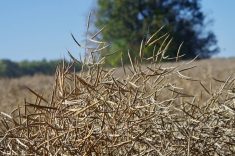Saskatchewan’s ag ministry has pledged $1.2 million to a project to map the flax genome with an eye toward developing flax as a “dual-purpose” crop.
The Total Utilization of Flax Genomics (TUFGEN) project, led by Gordon Rowland of the University of Saskatchewan’s College of Agriculture and Bioresources, and by Sylvie Cloutier of Agriculture and Agri-Food Canada in Winnipeg, is meant to investigate flax performance by looking at the DNA sequence of the entire genome.
TUFGEN is also expected to develop genetic and physical maps outlining the relationship of genes important for improving flax usefulness, the university said in a release.
Read Also

Feed Grain Weekly: Corn affecting barley prices in Lethbridge
Corn imports entering Lethbridge have lowered prices for feed barley compared to those in Edmonton.
“The project’s goal is to develop flax as a dual-purpose crop and to sequence the flax genome,” said Rowland. “This is an invaluable contribution to flax research that will help increase its value for producers.”
The province will also put up $680,000 toward another genomics project, Value Generation through Genomics (VALGEN).
VALGEN is led by Peter Phillips of the Johnson-Shoyama Graduate School of Public Policy at the U of S, and David Castle of the University of Ottawa, and is focused on “removing roadblocks to commercialization of new agriculture products and technologies,” the U of S said.
VALGEN is meant to explore the role of intellectual property, study ways of regulating and governing agricultural innovation, and adapt and test engagement tools with the Canadian public “to determine their interests, fears and attitudes concerning new technologies.”
“VALGEN research will help realize the economic and social potential of new products and technologies,” Phillips said. “It will do that by identifying solutions to problems that may arise, such as those faced by growers of early genetically-modified canola, a crop that was largely rejected in the European Union.”
“The University of Saskatchewan has become a leading centre in genomics research and teaching applications to agriculture, environment and human health,” Brett Fairbairn, U of S provost and vice-president academic, said in the same release.
“With the support of Genome Prairie and the government of Saskatchewan, this research will help ensure Canada has outstanding discovery potential and will stay competitive.”















